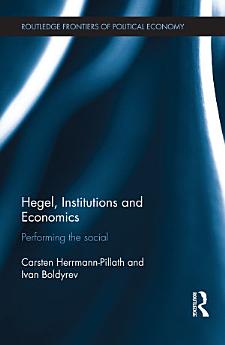Hegel, Institutions and Economics: Performing the Social
About this ebook
The key contributions of this Hegelian perspective on economics lead us to the synthesis of traditional approaches and new ideas gained in economic experiments and advanced by neuroeconomists, sociologists and cognitive scientists. The proper account of contemporary 'civil society' involves comprehending it as a historically evolving totality of individual minds, ideas and intersubjective structures that are mutually dependent, tied by recognitive relations, and assert themselves as a whole in the ongoing performative movement of 'objective spitit'. The ethics of recognition is paired with the ethics of associations that supports moral principles and gives them true, concrete universality.
This unusual constellation of seemingly remote fields suggests that Hegel, read in a pragmatist mode, anticipated the new theories and philosophies of extended mind, social cognition and performativity. By providing a new conceptual apparatus and reformulating the theory of institutions in the light of this new synthesis, this book claims to give new meaning both to Hegel as interpreted from today, and to the social sciences. Seen from this perspective, such phenomena as cooperation in games, personal identity or justice in the version of Amartya Sen's 'realization-focused comparisons' are reinscribed into the logic of institutional theory. This 'Hegel' clearly goes beyond the limits of philosophical discussion and becomes a decisive reference for economists, sociologists, political scientists and other scholars who study the foundations and consequences of human sociality and try to explore and design the institutions necessary for a worthy common life.
About the author
Carsten Herrmann-Pillath is a Professor of Economics and Academic Director of the East West Centre for Business Studies and Cultural Science at the Frankfurt School of Finance and Management, Germany
Ivan Boldyrev is an Associate Professor, National Research University Higher School of Economics, and Visiting Researcher, Humboldt University, Berlin.







